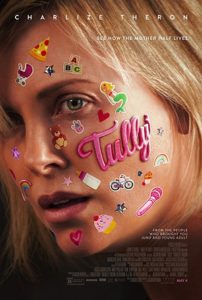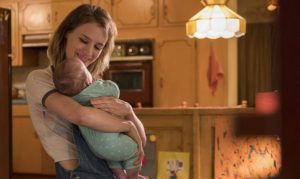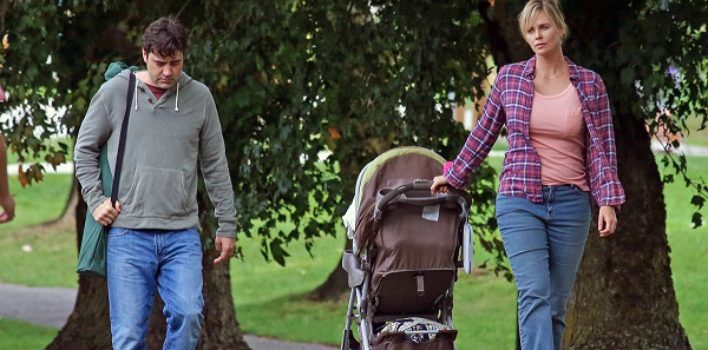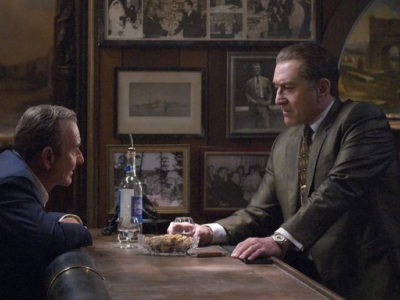Review| Tully
 Tully hit theaters right before Mother’s Day. The trailer shows a raw, though apt picture of motherhood and I would guess many people, like me, decided to take their mom to watch the film. I’m also guessing that most people who went to see the it, whether with their mom or not, were taken aback by what the film actually turned out to be.
Tully hit theaters right before Mother’s Day. The trailer shows a raw, though apt picture of motherhood and I would guess many people, like me, decided to take their mom to watch the film. I’m also guessing that most people who went to see the it, whether with their mom or not, were taken aback by what the film actually turned out to be.
You might be more familiar with director/writer duo Jason Reitman and Diablo Cody from their critically acclaimed project, Juno. Tully strays a bit from their original collaboration in tone, but many of themes remain – the pain of growing up, major life transitions, and the discomfort of those experiences. Overall, Tully is a poignant look at motherhood, wrestling with who you were, and coming to terms with who you’ve become. Much like Reitman’s other films, to enjoy the journey you have to be willing to sit in the painful moments with the characters and walk away with more questions than answers by the end of it.
Marlo (Charlize Theron) is awaiting the arrival of her third child who was not exactly planned, and she’s doing so with the added struggle of facing mid-life. She’s over 40 now and has a lot less energy than she did when her daughter was born 8 years earlier. She already has a full plate with two young kids, one of which is struggling with some undiagnosed “quirks”. Her husband, Drew (Ron Livingston) is caring, but tends to be aloof, whether his literal presence is missed while he’s traveling for work, or he’s checked out playing his video games, we get the sense that Marlo is isolated as she faces all of the challenges of motherhood.
 Marlo and Drew are just keeping their heads above water, which is why their tough situation is brought into even sharper view when they visit Marlo’s brother (Mark Duplass) and his wife who also have three kids but are experiencing a very different, nearly charmed, existence made possible by their wealth. At first Marlo is offended when her brother offers to “gift” her a night nanny, but when baby comes and life becomes an exhausting routine of dirty diapers, late night feedings, and juggling the rest of her family’s needs, she reconsiders and calls the night nanny service.
Marlo and Drew are just keeping their heads above water, which is why their tough situation is brought into even sharper view when they visit Marlo’s brother (Mark Duplass) and his wife who also have three kids but are experiencing a very different, nearly charmed, existence made possible by their wealth. At first Marlo is offended when her brother offers to “gift” her a night nanny, but when baby comes and life becomes an exhausting routine of dirty diapers, late night feedings, and juggling the rest of her family’s needs, she reconsiders and calls the night nanny service.
When Tully arrives on the scene, Marlo starts to come alive again when she gets extra help and rest and she quickly gets used to having a stranger care for her baby at night. Tully seems to integrate seamlessly into Marlo’s life and anticipates her needs even before she knows them herself. At one point Tully tells Marlo, “You can’t take care of the parts without taking care of the whole.” Tully seems know exactly what those parts are and how to remedy them.
The film takes some unexpected turns and while I won’t go into spoilers here, I will say the way this film explores mental health ultimately highlights the stories’ strengths and weaknesses. We’re never given an actual diagnosis for Marlo’s son, Jonah, but it’s uncomfortable to feel like he’s not getting all of the help he needs. The same feelings come up later when Marlo’s postpartum depression she experienced after Jonah’s birth comes back into view. As someone who has had a family member struggle with mental health issues, I appreciated the opportunity for discussion, but I also felt like the ending left me hanging.
 Sitting in the discomfort of Marlo’s struggle is difficult as a viewer, but it also provides an opportunity for reflection. The constant effort to justify our life decisions and reconcile who we dreamed we could be with who we’ve actually are is something that the film invites us to consider too. “If I had a dream that didn’t come true, I could at least be pissed at the world,” Marlo shares. “Instead, I’m just pissed at myself.” On the surface, this film is a raw portrayal of a mom who is struggling not to lose herself in the duties of motherhood, but underneath, it’s much more. It’s a wrestle that we can all relate too. I’d cautiously recommend this movie. It may be a trigger for some, but if you can sit in the discomfort and draw some of the deeper implications, it’s a great film and a good opportunity to call your mom and thank her for braving motherhood for you.
Sitting in the discomfort of Marlo’s struggle is difficult as a viewer, but it also provides an opportunity for reflection. The constant effort to justify our life decisions and reconcile who we dreamed we could be with who we’ve actually are is something that the film invites us to consider too. “If I had a dream that didn’t come true, I could at least be pissed at the world,” Marlo shares. “Instead, I’m just pissed at myself.” On the surface, this film is a raw portrayal of a mom who is struggling not to lose herself in the duties of motherhood, but underneath, it’s much more. It’s a wrestle that we can all relate too. I’d cautiously recommend this movie. It may be a trigger for some, but if you can sit in the discomfort and draw some of the deeper implications, it’s a great film and a good opportunity to call your mom and thank her for braving motherhood for you.







